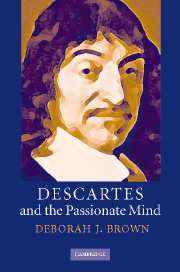Book contents
- Frontmatter
- Contents
- Acknowledgements
- Note on references
- Introduction
- 1 Volo ergo sum: the unity and significance of Les Passions de l'âme
- 2 Perturbations or sweet pleasures? Descartes' place in two traditions regarding the passions
- 3 The natural integration of reason and passion
- 4 Representing and referring
- 5 Action and passion: metaphysical integrationism
- 6 Wonder and love: extending the boundaries of the Cartesian knower and the Cartesian self
- 7 Several strange passages on desire and fortune
- 8 Generosity breeds content: self-mastery through self-esteem
- Bibliography
- Index
5 - Action and passion: metaphysical integrationism
Published online by Cambridge University Press: 15 December 2009
- Frontmatter
- Contents
- Acknowledgements
- Note on references
- Introduction
- 1 Volo ergo sum: the unity and significance of Les Passions de l'âme
- 2 Perturbations or sweet pleasures? Descartes' place in two traditions regarding the passions
- 3 The natural integration of reason and passion
- 4 Representing and referring
- 5 Action and passion: metaphysical integrationism
- 6 Wonder and love: extending the boundaries of the Cartesian knower and the Cartesian self
- 7 Several strange passages on desire and fortune
- 8 Generosity breeds content: self-mastery through self-esteem
- Bibliography
- Index
Summary
For the soul and the body together, we have only that [primitive notion] of their union, on which depends that of the force by which the soul moves the body, and of the body for acting upon the soul causing in it sensations [sentimens] and passions.
(AT iii, 665)When Elisabeth requests from Descartes a definition of the soul ‘more particular than in your Metaphysic, that is to say, of its substance separate from its action, thought’ in order to explain how ‘the soul of a human being is able to determine the spirits of the body to produce voluntary actions’ her suspicion is that nothing can move or be moved by a body without being a body itself (6/16 May 1643, AT iii, 66). Previously persuaded by Descartes' arguments for a real distinction of mind and body, Elisabeth begins to doubt the coherence of the idea that these two heterogeneous substances might nonetheless interact. As noted in chapter 1, Descartes does not address Elisabeth's objection directly, but the Passions represents something of an attempt to ground the interaction between mind and body in a way that is, at least, perfectly consistent with his dualism. In light of their exchange, it is not surprising that the Passions begins on what would have seemed to be a distinctively metaphysical note. In the first two articles, Descartes invokes the (Aristotelian) categories of action and passion, which specify the conceptual relationship that obtains between substances or within a single substance when a natural change occurs.
- Type
- Chapter
- Information
- Descartes and the Passionate Mind , pp. 116 - 140Publisher: Cambridge University PressPrint publication year: 2006



